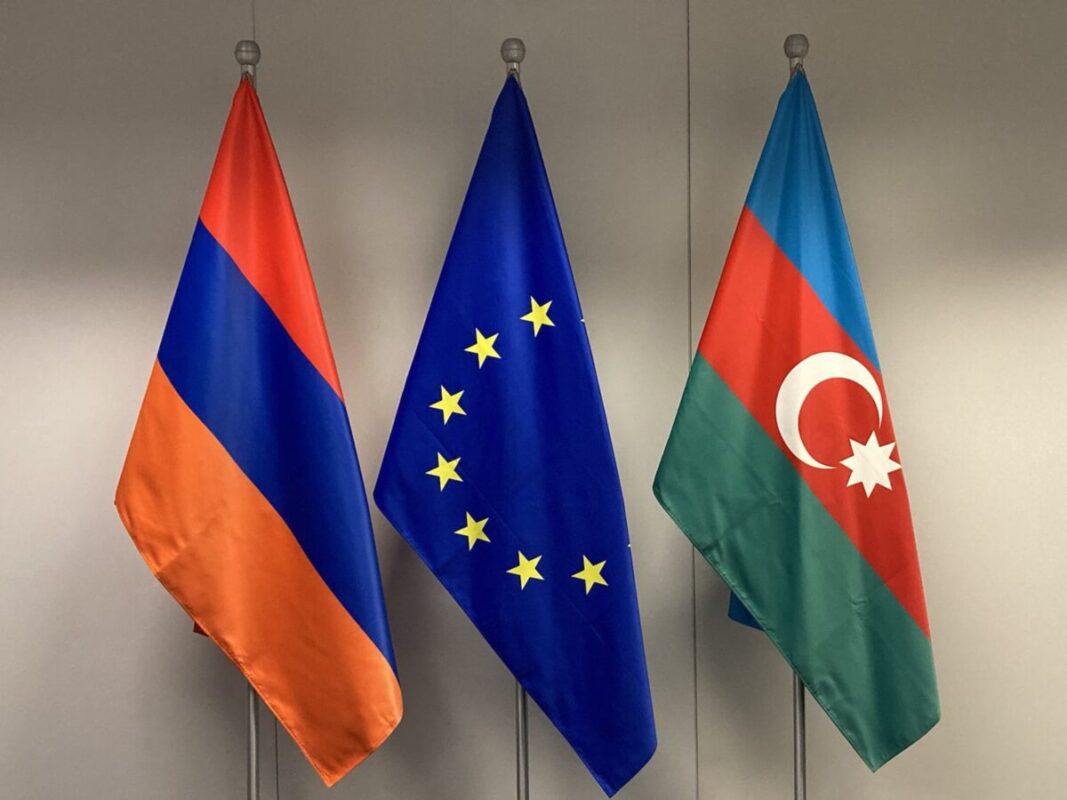
The post South Caucasus News – 6:22 AM 9/29/2023: Why Is Erdoğan Desperate For The US To Sell F-16 Fighter Jets To … – GreekCityTimes.com first appeared on The News And Times – thenewsandtimes.com.

 Armenia: EBU Monitoring Whether Junior Eurovision 2023 … Eurovoix
Armenia: EBU Monitoring Whether Junior Eurovision 2023 … EurovoixThe post South Caucasus News – 6:22 AM 9/29/2023: Why Is Erdoğan Desperate For The US To Sell F-16 Fighter Jets To … – GreekCityTimes.com first appeared on The News And Times – thenewsandtimes.com.

Artak Beglaryan, former Minister of State of Artsakh (Nagorno-Karabakh), reflected on the decree signed Thursday by the Artsakh President to dissolve the Artsakh Republic.
“Artsakh President’s decree on dissolving the Republic is illegal & illegitimate:
“1. No President has the power to dissolve the Republic formed by the people with referendum;
“2. That decree was signed as a result of Azerbaijani harsh aggression & threat of force.
“It’s null & void,” Beglaryan wrote on X—former Twitter.
The post Karabakh ex-official: No president has power to dissolve republic formed by people, with referendum first appeared on The News And Times – thenewsandtimes.com.

Artak Beglaryan, former Minister of State of Artsakh (Nagorno-Karabakh), reflected on the decree signed Thursday by the Artsakh President to dissolve the Artsakh Republic.
“Artsakh President’s decree on dissolving the Republic is illegal & illegitimate:
“1. No President has the power to dissolve the Republic formed by the people with referendum;
“2. That decree was signed as a result of Azerbaijani harsh aggression & threat of force.
“It’s null & void,” Beglaryan wrote on X—former Twitter.
The post Karabakh ex-official: No president has power to dissolve republic formed by people, with referendum first appeared on The News And Times – thenewsandtimes.com.
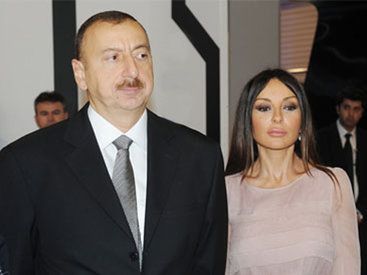
President of the Republic of Azerbaijan Ilham Aliyev and First
Lady Mehriban Aliyeva have signed an obituary on the death of
Azerbaijani MP Ganira Pashayeva, Azernews reports.
—
Follow us on Twitter @AzerNewsAz
The post Azerbaijani President, First Lady sign obituary on death of Azerbaijani MP first appeared on The News And Times – thenewsandtimes.com.
The winner of the 2023 Nobel Peace Prize will be announced on Oct. 6 in Oslo. Here is a look at how the award works:
According to the will of Swedish industrialist Alfred Nobel, the inventor of dynamite, the prize should go to the person “who has done the most or best to advance fellowship among nations, the abolition or reduction of standing armies, and the establishment and promotion of peace congresses.”
Thousands of people can propose names: members of governments and parliaments; current heads of state; university professors of history, social sciences, law and philosophy; and former Nobel Peace Prize laureates, among others.
This year there are 351 nominees, although the full list will be locked in a vault for 50 years.
Among oddsmakers’ favourites this year are Ukrainian President Volodymyr Zelenskiy and Russia’s Alexei Navalny, though experts say they are unlikely to win.
Zelenskiy is a war leader while the committee focused on Russia last year, lowering both men’s chances.
The Norwegian Nobel Committee, which consists of five individuals appointed by the Norwegian parliament, is the arbiter. Members are often retired politicians, but not always. The current committee is led by a lawyer and includes an academic.
They are all put forward by Norwegian political parties and their appointments reflect the balance of power in Norway’s parliament.
Nominations close on Jan. 31. Members of the committee can make their own nominations no later than at the first meeting of the committee in February.
They discuss all the nominations, then establish a shortlist. Each nominee is then assessed and examined by a group of permanent advisers and other experts.
The committee meets roughly once a month to discuss the nominations. They usually make their decision at the final committee meeting, which tends to be at the beginning of October.
The committee seeks a consensus on its selection. If it cannot, the decision is reached by majority vote.
The last time a member quit in protest was in 1994, when Palestinian leader Yasser Arafat shared the prize with Israel’s Shimon Peres and Yitzhak Rabin.
While the full list of nominations is kept secret, nominators are free to disclose them.
Among the names disclosed are Greta Thunberg and fellow environmental campaigner Vanessa Nakate, jailed Russian opposition politician Vladimir Kara-Murza and Chinese protester Peng Lifa.
Experts who follow the award say this year’s prize may highlight human rights activists in a year that marks the 75th anniversary of the Universal Declaration of Human Rights.
The committee could also highlight climate change and reward the Fridays for Future movement, started by Greta Thunberg.
A medal, a diploma, 11 million Swedish crowns ($994,000)- and immediate global attention.
South African Archbishop Desmond Tutu, the 1984 winner, said becoming a Nobel laureate was a double-edged sword. “One day no one was listening. The next, I was an oracle,” he is quoted as saying in his authorised biography.
The announcement will be made at 1100 CET (0900 GMT) on Oct. 6 at the Norwegian Nobel Institute in Oslo by the chair of the Norwegian Nobel Committee, Berit Reiss-Andersen.
The ceremony will take place at the Oslo City Hall on Dec. 10, the anniversary of Alfred Nobel’s death.
($1 = 11.0607 Swedish crowns)
The post Nobel Peace Prize: how does it work? first appeared on The News And Times – thenewsandtimes.com.
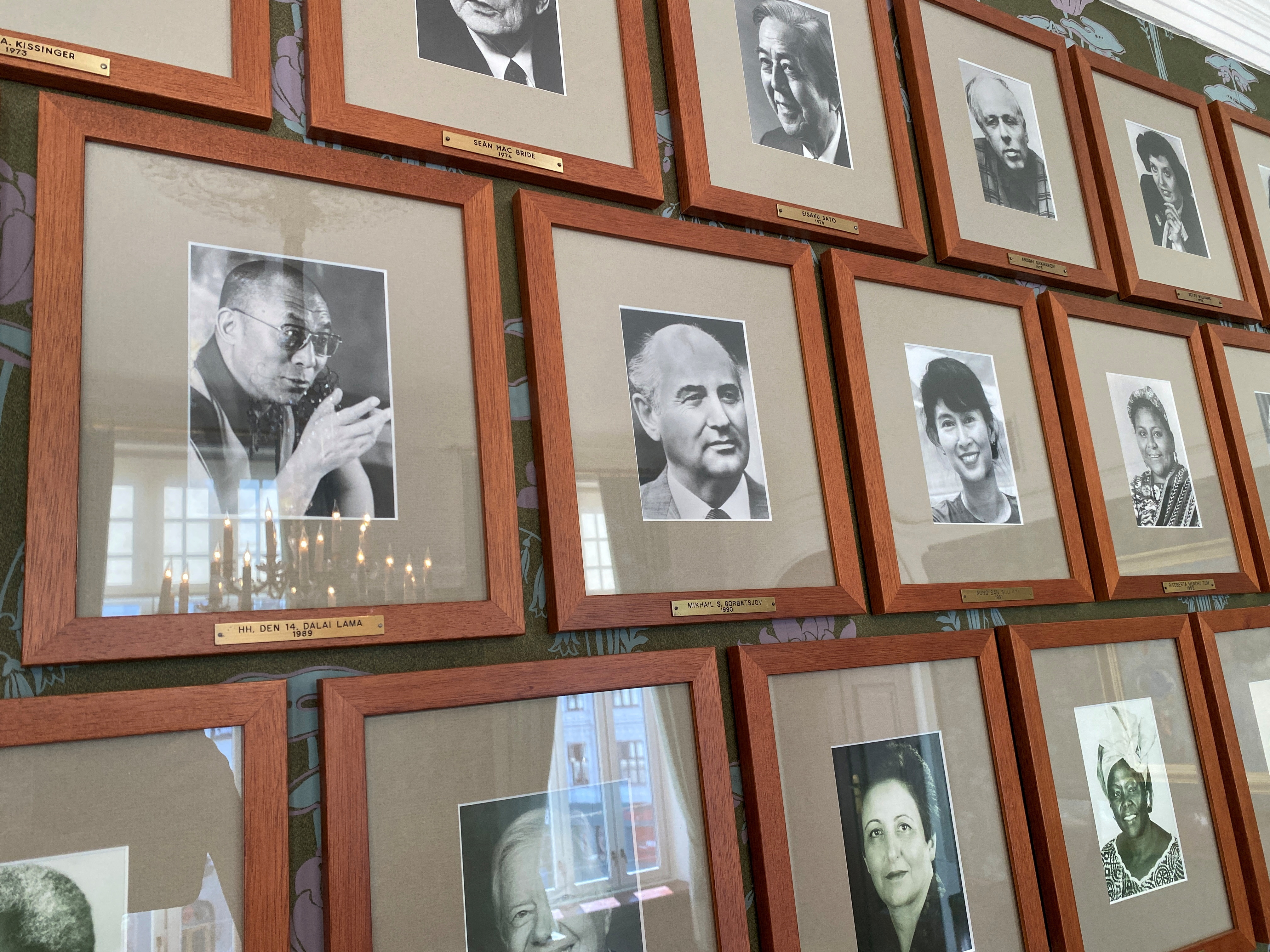
The winner of the 2023 Nobel Peace Prize will be announced on Oct. 6 in Oslo. Here are some past winners – and one person who did not but should have.
The leader of the U.S. civil rights movement was “the first person in the Western world to have shown us that a struggle can be waged without violence,” according to the then chairman of the award body, Gunnar Jahn.
“He is the first to make the message of brotherly love a reality in the course of his struggle, and he has brought this message to all men, to all nations and races.”
At 35, he was also the youngest Nobel Peace Prize laureate at the time. Today the youngest winner is Pakistan’s education campaigner Malala Yousafzai, who was 17 when she won in 2014.
The Nobel Peace Prize has been controversial on many occasions but most agreed in 1993 that Mandela winning the award was “self-evident”, according to Geir Lundestad, the then secretary of the Norwegian Nobel committee.
Mandela spent 27 years in prison and still called for a peaceful transition to end apartheid in South Africa.
What was not self-evident was awarding the prize jointly with Frederik Willem de Klerk, the last white leader of South Africa, Lundestad said in his 2015 memoir.
Many said Mandela should have won alone, while others said Mandela could not make peace without a counterpart, recounted Lundestad. In the end, the prize was given to both to encourage the peaceful transition to a democratic South Africa, which was not completed by the time of the award.
Among the most controversial awards is the 1973 one to top U.S. diplomat Henry Kissinger and North Vietnam’s Le Duc Tho for reaching the January 1973 Paris Peace Accords under which Washington completed a military withdrawal from South Vietnam.
The Nobel committee’s decision shocked many at the time as Kissinger played a major role in U.S. military strategy in the final stages of the 1955-75 Vietnam war.
Le Duc Tho refused the prize on the grounds peace had not yet been established. Two of the five committee members resigned in protest.
Kissinger, while accepting the award, did not travel to Norway for the ceremony and later tried in vain to return the prize.
Internal documents released in January of 2023 showed the then committee gave the award in the full knowledge the Vietnam War was unlikely to end any time soon.
One of the few women to win the award, Suu Kyi was one of a string of human rights campaigners in the 1990s to receive the Nobel Peace Prize, for her non-violent struggle for democracy against the military dictatorship in Myanmar.
For years she was hailed as one of the best recipients of the award, but that changed after the Myanmar military carried out mass killings and gang rapes “with genocidal intent” according to a United Nations investigation.
Suu Kyi, who led the Myanmar government at the time, has been criticised for failing to speak out against the army crackdown against the Rohingyas.
In 2021, following a new military coup, Suu Kyi was arrested again. The 79-year-old is currently in jail and her health is ailing, according to her son.
He was on the committee’s internal discussion list of candidates on five different occasions, with the body prepared to award him in 1948, the year he was assassinated, according to Lundestad.
The committee could still have given it to him posthumously – it was possible at the time but no longer is – but did not.
According to Lundestad, it may be because the committee did not want to offend close ally Britain, the former colonial power in India, or because the politics of Gandhi may have been perceived as too “foreign” or “anti-modern” by members of a Europe-centric committee.
The violence of India’s partition could also have played a part, he said. At least one million people were killed and 15 million were uprooted.
In any case, “among the omissions, Mahatma Gandhi stands in a class of his own,” writes Lundestad in his memoir.
“It is of course extremely unfortunate that the 20th century’s leading spokesman for non-violence never received the Nobel Peace Prize.”
The post Nobel Peace Prize: who has won and who missed out? first appeared on The News And Times – thenewsandtimes.com.
(Reuters) – Saudi Arabia is determined to secure a military pact requiring the United States to defend the kingdom in return for opening ties with Israel and will not hold up a deal even if Israel does not offer major concessions to Palestinians in their bid for statehood, three regional sources familiar with the talks said.
A pact might fall short of the cast-iron, NATO-style defence guarantees the kingdom initially sought when the issue was first discussed between Crown Prince Mohammed bin Salman and Joe Biden during the U.S. president’s visit to Saudi Arabia in July 2022.
Instead, a U.S. source said it could look like treaties Washington has with Asian states or, if that would not win U.S. Congress approval, it could be similar to a U.S. agreement with Bahrain, where the U.S. Navy Fifth Fleet is based. Such an agreement would not need congressional backing.
Washington could also sweeten any deal by designating Saudi Arabia a Major Non-NATO Ally, a status already given to Israel, the U.S. source said.
But all the sources said Saudi Arabia would not settle for less than binding assurances of U.S. protection if it faced attack, such as the Sept. 14, 2019 missile strikes on its oil sites that rattled world markets. Riyadh and Washington blamed Iran, the kingdom’s regional rival, although Tehran denied having a role.
Agreements giving the world’s biggest oil exporter U.S. protection in return for normalisation with Israel would reshape the Middle East by bringing together two longtime foes and binding Riyadh to Washington after China’s inroads in the region. For Biden, it would be a diplomatic victory to vaunt before the 2024 U.S. election.
The Palestinians could get some Israeli restrictions eased but such moves would fall short of their aspirations for a state. As with other Arab-Israeli deals forged over the decades, the Palestinian core demand for statehood would take a back seat, the three regional sources familiar with the talks said.
“The normalisation will be between Israel and Saudi Arabia. If the Palestinians oppose it the kingdom will continue in its path,” said one of the regional sources. “Saudi Arabia supports a peace plan for the Palestinians, but this time it wanted something for Saudi Arabia, not just for the Palestinians.”
The Saudi government and the U.S. State Department did not respond to emailed questions about this article.
‘LESS THAN A FULL TREATY’
A U.S. official, who like others declined to be named because of the sensitivity of the matter, said the parameters of a defence pact were still being worked out, adding that what was being discussed “would not be a treaty alliance or anything like that … It would be a mutual defence understanding, less than a full treaty.”
The official said it would be more like the U.S. relationship with Israel, which receives the most advanced U.S. weapons and holds joint air force and missile defence drills.
A source in Washington familiar with the discussions said MbS had asked for a NATO-style treaty but said Washington was reluctant to go as far as NATO’s Article 5 commitment that an attack on one ally is considered an attack on all.
The source said Biden’s aides could consider a pact patterned on those with Japan and other Asian allies, under which the U.S. pledges military support but is less explicit about whether U.S. troops would be deployed. However, the source said some U.S. lawmakers might resist such a pact.
Another template, which would not need congressional approval, would be the agreement signed with Bahrain on Sept. 13, in which the U.S. pledged to “deter and confront any external aggression” but also said the two governments would consult to determine what, if any, action would be taken.
The source in Washington said Saudi Arabia could be designated a Major Non-NATO Ally, a step which had long been considered. This status, which several Arab states such as Egypt have, comes with a range of benefits, such as training.
The second of the regional sources said Riyadh was compromising in some demands to help secure a deal, including over its plans for civilian nuclear technology. The source said Saudi Arabia was ready to sign Section 123 of the U.S. Atomic Energy Act, establishing a framework for U.S. peaceful nuclear cooperation, a move Riyadh previously refused to take.
The Gulf source said the kingdom was prepared to accept a pact that did not match a NATO Article 5 guarantee but said the U.S. had to commit to protecting Saudi Arabia if its territory was attacked. The source also said a deal could be similar to Bahrain’s agreement but with extra commitments.
Israel’s Prime Minister Benjamin Netanyahu has hailed the possibility of a “historic” peace with Saudi Arabia, the heartland of Islam. But to secure the prize, Netanyahu has to win the approval of parties in his a far-right coalition which reject any concessions to the Palestinians.
MbS said in a Fox News interview this month that the kingdom was moving steadily closer to normalising ties with Israel. He spoke about the need for Israel to “ease the life of the Palestinians” but made no mention of Palestinian statehood.
Nevertheless, diplomats and the regional sources said MbS was insisting on some commitments from Israel to show he was not abandoning the Palestinians and that he was seeking to keep the door open to a two-state solution.
Those would include demanding Israel transfer some Israeli-controlled territory in the West Bank to the Palestinian Authority (PA), limit Jewish settlement activity and halt any steps to annex parts of the West Bank. Riyadh has also promised financial aid to the PA, the diplomats and sources said.
Palestinian President Mahmoud Abbas has said any bargain must recognise the Palestinian right to a state within the 1967 borders, including East Jerusalem, and must stop Israeli settlement building. However, all the sources said a Saudi-Israeli deal was unlikely to address those flashpoint issues.
Netanyahu has said Palestinians should not have a veto over any peacemaking deal.
Yet, even if the U.S, Israel and Saudi Arabia agree, winning support from lawmakers in the U.S. Congress remains a challenge.
Republicans and those in Biden’s Democratic Party have previously denounced Riyadh for its military intervention in Yemen, its moves to prop up oil prices and its role in the 2018 killing of Saudi journalist Jamal Khashoggi, who worked for the Washington Post. MbS denied ordering the killing.
“What’s important for Saudi Arabia is for Biden to have the pact approved by Congress,” the first regional source said, pointing to concessions Riyadh was making to secure a deal.
For Biden, a deal that builds a U.S.-Israeli-Saudi axis could put a brake on China’s diplomatic inroads after Beijing brokered a rapprochement between Saudi Arabia and Iran, which Washington accuses of seeking nuclear arms. Tehran denies this.
“There was a sense that the U.S. has abandoned the region,” said one diplomat. “By courting China, the Saudis wanted to create some anxiety that will make the U.S. re-engage. It has worked.”
The post Exclusive-US-Saudi defence pact tied to Israel deal, Palestinian demands put aside first appeared on The News And Times – thenewsandtimes.com.
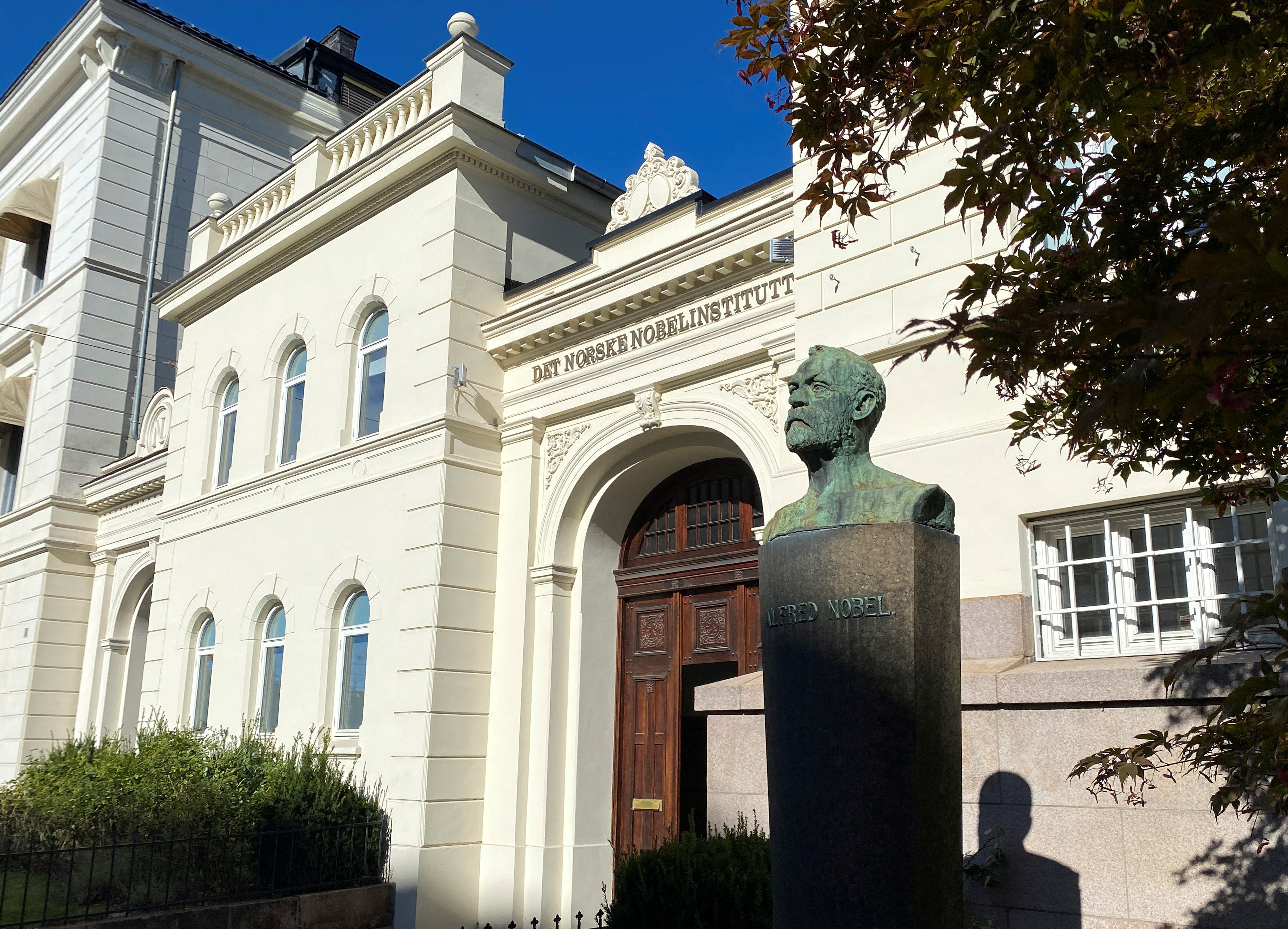
The Nobel prizes, arguably the world’s most prestigious awards, are being revealed over coming days, starting Monday.
The prizes, with a 11 million Swedish crown ($994,000) award each, are given for achievements in physics, literature, medicine or physiology, chemistry and peace.
The Nobel Prize was created by wealthy Swedish inventor Alfred Nobel, who in his will dictated that his estate should be used to fund “prizes to those who, during the preceding year, have conferred the greatest benefit to humankind.”
Nobel died in 1895 but it took until 1901, following fighting over his will, before the first awards.
Nobel named the Royal Swedish Academy of Sciences to award the prizes for chemistry and physics, the Swedish Academy for literature, Sweden’s Karolinska Institute university for physiology or medicine, and the Norwegian parliament for peace. It is not known why Nobel chose Norway, which at the time was in a union with Sweden, to hand out the peace prize.
In 1968, when Sweden’s central bank was celebrating its 300th anniversary, it established the Prize in Economic Sciences in Memory of Alfred Nobel with a donation to the Nobel Foundation. The prize is awarded by the Royal Swedish Academy of Sciences, according to the same principles as the other prizes.
Notable Nobel laureates include scientists like Albert Einstein, Niels Bohr and Marie Curie, authors like Ernest Hemingway and Albert Camus, and inspirational leaders like Nelson Mandela, Martin Luther King Jr. and Mother Teresa.
While most achievements are still celebrated, some awards have not aged well, such as Egas Moniz’ 1949 prize in physiology or medicine for the since banned and discredited practice of lobotomy.
Many peace prizes have also been criticized, including those for Henry Kissinger, Yasser Arafat, Yitzhak Rabin, and Shimon Peres. Failure to give the prize to Mahatma Gandhi before his death in 1948 is also seen by many as a mistake.
The Nobel prizes are presented to the laureates on Dec. 10, the anniversary of Nobel’s death. The peace prize is handed out by the chairman of the Norwegian Nobel committee in Oslo, while the other prizes are presented by the Swedish king in Stockholm’s Concert Hall.
During the evening some 1,300 guests are treated to a lavish banquet at Stockholm City Hall. The banquet requires extensive planning and the food is prepared by a head chef, eight head waiters, 210 waiters and waitresses, five wine waiters and 20 cooks.
Months before the banquet, three menus suggested by selected chefs are presented to the Nobel Foundation for tasting. The selected menu is kept secret until the day of the Nobel Banquet.
The menus aim to have a touch of Scandinavia and last year’s menu included a starter of seaweed baked pike-perch, main course of venison filled with morel and sage, and desert of baked cheesecake and plum compote.
($1 = 11.0622 Swedish crowns)
The post What are the Nobel prizes? first appeared on The News And Times – thenewsandtimes.com.
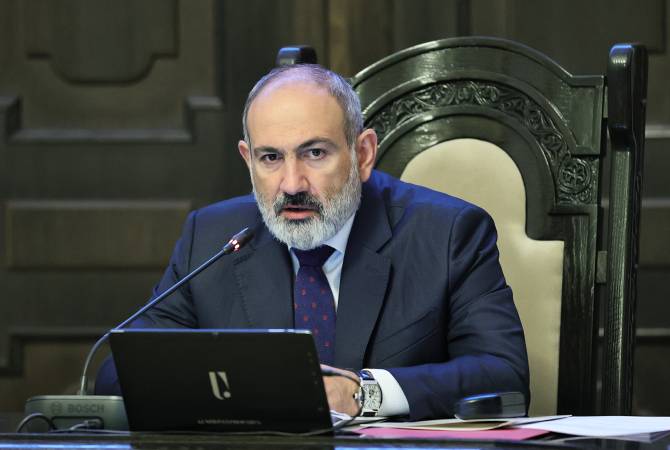 11:26, 28 September 2023
11:26, 28 September 2023
YEREVAN, SEPTEMBER 28, ARMENPRESS. Analysis shows that no Armenian will be left in Nagorno-Karabakh in the coming days, Prime Minister Nikol Pashinyan warned Thursday.
“The exodus of Armenians from Nagorno-Karabakh continues as a result of the policy of ethnic cleansing carried out by Azerbaijan. Analysis shows that no Armenian will be left in NK in the coming days. This is a direct act of ethnic cleansing and [dispossession], and what we’ve been warning about the international community for a long time. The statements made by various international actors condemning ongoing ethnic cleansings in NK are important, but if no concrete actions follow these statements will be viewed only for creating a moral statistics for history,” PM Pashinyan said.
He warned that various countries, by simply making statements and not taking action, are trying to have an opportunity to separate themselves from this crime, in order to then be able to say ‘well, we had condemned it.’
“If no relevant political and legal decisions follow the statements on condemning it, the condemnations become acts of giving consent to what’s happening. Regarding the Government of Armenia, our primary duty today is to receive our brothers and sisters forcibly displaced from NK with the utmost care and ensure their urgent needs are met,” Pashinyan said.

Azerbaijan and “brother ally” Turkey turned up the heat on embattled Armenia on September 25, hinting that they may be set to push hard for Yerevan to agree to a land bridge across Armenian territory that would link their two countries.
As Armenia struggled to deal with the mass exodus of ethnic-Armenians fleeing the Nagorno-Karabakh enclave in the wake of last week’s decisive one-day military offensive conducted by Azerbaijan, Turkey’s President Recep Tayyip Erdogan pointedly met Azerbaijani counterpart Ilham Aliyev for the opening of a newly modernised military installation in Azerbaijan’s Nakhchivan exclave—the territory holds great importance in that Baku wants to carve a land corridor across Armenia from the main part of Azerbaijan to Nakhchivan, which borders Turkey.
Azerbaijan and Turkey—which often refer to their two countries as “two states, one nation”—insist Armenia promised to accept such a corridor in the Russian-brokered ceasefire talks that ended the 44-day Second Nagorno-Karabakh War in late 2020, something that Yerevan denies.
At a joint news conference following their meeting, at which neither strongman took any questions, Aliyev lamented how Soviet-era authorities had decided that, part of what he said should have been territory belonging to the Azerbaijani Soviet republic, was land belonging to the Armenian Soviet republic.
“The land link between the main part of Azerbaijan and Nakhchivan was thus cut off,” complained Aliyev, as reported by Reuters.
The corridor, if built, would stretch across Armenia’s southern Syunik province. Both Azerbaijan and Nato member Turkey refer to it as the Zangezur Corridor.
Addressing the UN General Assembly in New York on September 19, the very day Azerbaijan invaded ethnic-Armenian-controlled Karabakh, Erdogan referred to the desired land link, saying: “We expect a comprehensive peace agreement between the two countries [Azerbaijan and Armenia] as soon as possible and for promises to be quickly fulfilled, especially on the opening of the Zangezur corridor.”
Aliyev has since the last Karabakh war occasionally become rather bellicose about his demand for the corridor. In 2021, he threatened to create it “whether Armenia likes it or not”.
However, a big difficulty for Aliyev is that Nakhchivan and Syunik both border Iran and any land bridge would necessarily run parallel to the Armenian-Iranian border. Tehran has made it clear that it is staunchly opposed to any developments near its border that could interfere with its trade routes via Syunik and is clearly also greatly concerned that such a corridor would extend Turkey’s geopolitical heft across both the South Caucasus and Central Asia, which borders Azerbaijan. There were fresh reports this week in the Iranian media of Tehran beefing up its military deployments near Iran’s borders with Armenia and Azerbaijan.
Russia’s current stance on whether the corridor should be permitted by Armenia is not clear, but Moscow is engaged in an increasingly bitter spat with Armenia over Yerevan’s accusation that Russia has not lived up to its security commitments as Armenia’s strategic partner and the Armenian government’s newly expressed willingness to strengthen ties with the West.
Speaking after his meeting with Erdogan in Nakhchivan, where the pair also attended a gas pipeline groundbreaking ceremony, Aliyev—as reported by Turkish state-run news service Anadolu Agency—said: “[Azerbaijan and Turkey] want peace and stability in the region, not war”.
The meeting, however, has clearly sown plenty of anxiety.
Thomas de Waal, a senior fellow at think tank Carnegie Europe who specialises in Eastern Europe and the Caucasus, wrote on his X platform microblog that Azerbaijan and Turkey could present an ultimatum to Armenia over the corridor, saying: “Days after Azerbaijan’s military takeover of Karabakh, Presidents Aliyev and Erdogan meet in Nakhchivan today and will very likely make ultimatums to the Armenian government to ‘open the Zangezur Corridor or else…’
“Can we be really going the world of 1918-21 when big powers try to use force to draw and redraw the map of the Caucasus? Let it not be so.”
IE 11 is not supported. For an optimal experience visit our site on another browser.
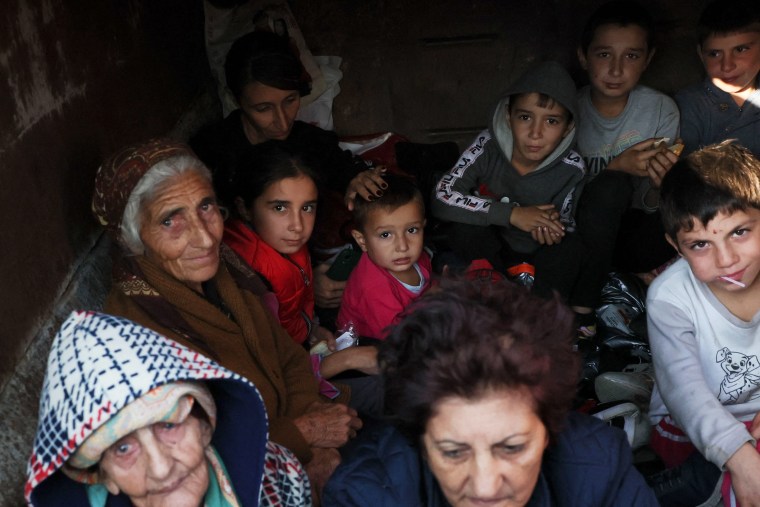
Refugees sit in the back of a truck near Kornidzor, Armenia, on Thursday. Alain Jocard / AFP – Getty Images
After more than half the population of an ethnic Armenian enclave fled their homes in a mountainous pocket of land south of Russia, the breakaway republic’s leaders said it would soon “cease to exist.”
In what amounted to a formal capitulation to Azerbaijan, which surrounds it, the Armenian leaders of Nagorno-Karabakh said the self-declared Republic of Artsakh would be dismantled by the end of the year.
This would end three decades of intermittent conflict in and around the enclave, break a 10-month blockade of the region in the South Caucasus that residents said had starved them into submission, and dash hopes of an independent state in territory claimed by Azerbaijan.
The dissolution of Nagorno-Karabakh as a breakaway state is a seminal point — a rare supernova among the constellation of ethnic conflicts left by the implosion of the then-Soviet Union in the early 1990s. The conflict’s abrupt halt reflects how the geopolitical reach of Russia’s invasion of Ukraine has forced realignments far beyond that war.
In an official decree, the region’s separatist President Samvel Shakhramanyan said that residents of Nagorno-Karabakh must now “familiarize themselves with the conditions of reintegration” into Azerbaijan and make “an independent and individual decision about the possibility of staying (or returning) in Nagorno-Karabakh.”
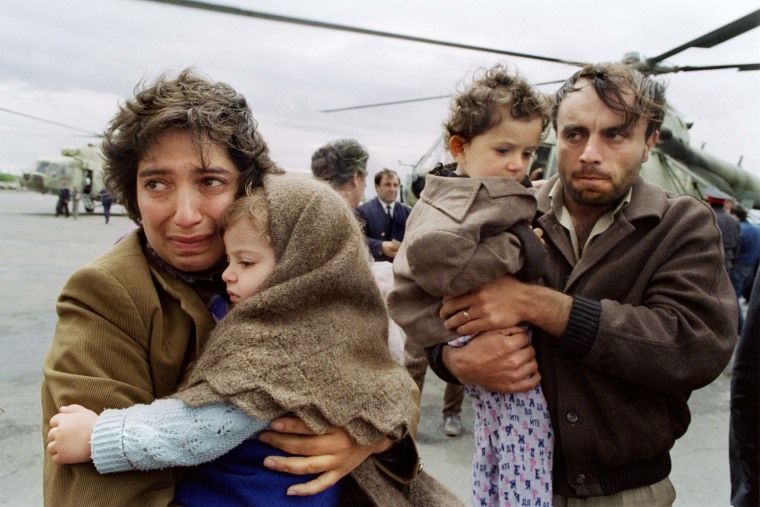 An Armenian family fleeing Nagorno-Karabakh arrives at Yerevan airport in 1991 after being evacuated by a Soviet army helicopter.Wojtek Druszcz / AFP via Getty Images
An Armenian family fleeing Nagorno-Karabakh arrives at Yerevan airport in 1991 after being evacuated by a Soviet army helicopter.Wojtek Druszcz / AFP via Getty ImagesThe announcement came as around 70,000 of the enclave’s population of about 120,000 fled from the region, which sits within Azerbaijan’s borders, to neighboring Armenia, according to Armenia’s government, with more still arriving.
Many residents hauled what few personal belongings they could gather into packed cars, trucks, buses and tractors, some pockmarked with shrapnel after days of Azerbaijani attacks.
Armenia’s leadership has accused Azerbaijan of instigating a refugee crisis by launching a swift invasion this week. Azerbaijan has denied allegations of “ethnic cleansing,” saying it is not forcing people to leave, and would peacefully reintegrate the region and guarantee rights of ethnic Armenians.
Holding a wealth of monasteries, mosques and other religious sites, Nagorno-Karabakh is culturally significant for both Muslim Azeris and what was an overwhelming Christian Armenian population. Armenians in Azerbaijan have been victims of pogroms, while Azerbaijanis claim discrimination and violence at the hands of Armenians.
“Azerbaijan has won a comprehensive military victory and what we’re looking at now is the prospect of Nagorno-Karabakh without Armenians or with very few Armenians remaining,” said Thomas de Waal, a senior fellow with the London-based Carnegie Europe think tank. “So in that sense, Azerbaijan has won.”
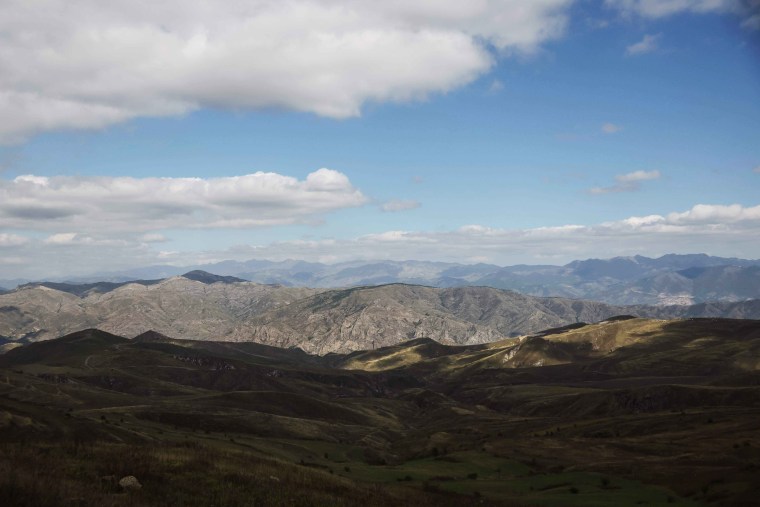 The Karabakh Mountains, seen from the Armenian side of the border with Azerbaijan on Wednesday.Alain Jocard / AFP – Getty Images
The Karabakh Mountains, seen from the Armenian side of the border with Azerbaijan on Wednesday.Alain Jocard / AFP – Getty ImagesFor those fleeing, the despair of losing their homes was made worse by losing their homeland.
“Many of them are from villages which were taken by the Azerbaijani army, so they really lost their homes already,” said Astrig Agopian, a French Armenian journalist who has been reporting this week on the refugee crisis from Armenia’s border. “There is really this feeling that this time is different. It’s another war, but it’s a war that is definitely lost this time.”
Were that the case, it would bring to an end decades of violence in the region, which has been at the center of geopolitical interests between Eastern and Western nations for centuries.
The political dispute between Armenia and Azerbaijan over Nagorno-Karabakh began as the then-Soviet Union weakened in the late 1980s, and Armenians demanded that the majority-Armenian region be incorporated into the Armenian Soviet Socialist Republic.
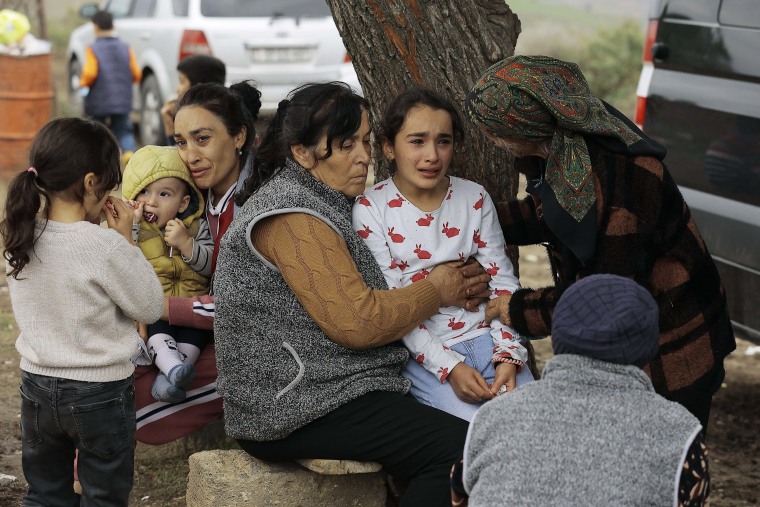 Ethnic Armenians from Nagorno-Karabakh comfort a young woman upon arriving in Kornidzor, Armenia, on Tuesday. Vasily Krestyaninov / AP
Ethnic Armenians from Nagorno-Karabakh comfort a young woman upon arriving in Kornidzor, Armenia, on Tuesday. Vasily Krestyaninov / APAfter the USSR collapsed in 1991, the conflict erupted into a full-scale war that persisted until a Russian-brokered peace deal in 1994. About 30,000 people were killed and more than a million people displaced.
“My husband died in the first war. He was 30, I was 26. Our children were 3 and 4 years old. It is the fourth war that I went through,” Narine Shakaryan, a grandmother of four, told the Reuters news agency after she arrived in Armenia. “My husband died back then, he was 30 in 1994. That’s the cursed life that we live.”
The fighting continued intermittently for several more decades, leaving an indelible mark on generations of Nagorno-Karabakh’s ethnic Armenian residents. A recent war in 2020 saw the more powerful Azerbaijan, backed by Turkey, reclaim much of the land surrounding the area, as well as part of the region itself.
Russia negotiated an end to that flare-up and even deployed peacekeepers to ensure security along the Lachin Corridor, the single mountain road that connected Armenia to Nagorno-Karabakh.
But the events of the past year show how Moscow, which has historically played the role of both peacekeeper and ally to Armenia — which shares its Christian roots and hosts a Russian military base — has adjusted its allegiances following its invasion of Ukraine and its conflicts with the West.
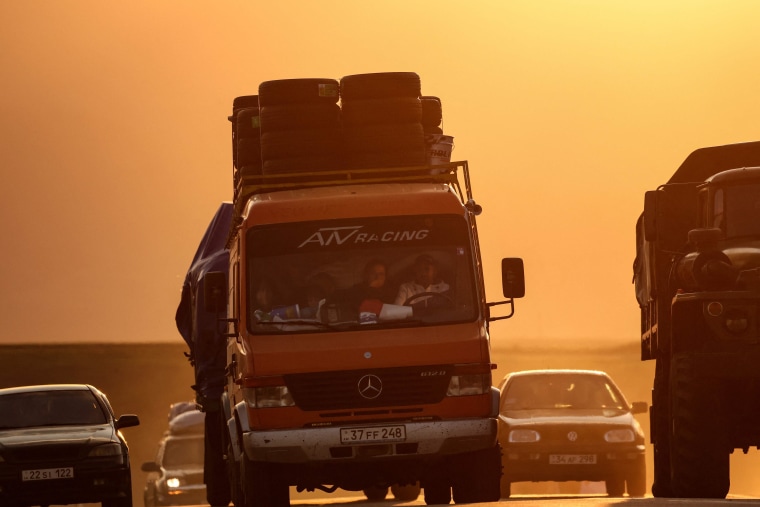 Refugees crossing the border near Kornidzor, Armenia, on Wednesday.Alain Jocard / AFP – Getty Images
Refugees crossing the border near Kornidzor, Armenia, on Wednesday.Alain Jocard / AFP – Getty Images“The pivotal factor was that Azerbaijan was talking separately to the Russians, and had a joint agenda with the Russians, to pressure Armenia and also to keep the West out of the Caucasus,” de Waal said. “This is why when the Azerbaijani assault happened, Russian peacekeepers who could have actually stopped it stood down. And then Russia failed to condemn the attack.”
After its invasion of Ukraine left Russia isolated, Moscow may feel it has more to gain from cozying up to Azerbaijan than Armenia, particularly after the latter made a public display of cozying up to the West and provided humanitarian aid to Kyiv.
Earlier this month, the country conducted joint exercises with the U.S. military and the Armenian Parliament is set to vote next week on whether to accede to the International Criminal Court, which classifies Russian President Vladimir Putin as a war criminal — a move the Kremlin characterized Thursday as “extremely hostile.”
Inside Nagorno-Karabakh, Azerbaijan’s government has assured the region’s Armenian population that they will be treated humanely and afforded equal rights.
But after months of blockades and blistering fighting, few ethnic Armenians believe it and many feel they have no choice but to flee.
“When Rabbis Bless Congress: The Great American Story of Jewish Prayers on Capitol Hill” … buy the new book here:
https://www.whenrabbisblesscongress.com
https://www.amazon.com/When-Rabbis-Bless-Congress-American/dp/1644693445/
Sen. BOB MENENDEZ 12-16-2020
“Indeed, adopting ad hoc changes
rather than looking at more comprehensive reform could actually create more problems down the road.
Many have noted that FARA’s definitions and requirements are broad and
sow confusion over exactly when and
under what circumstances an individual must register and report covered
activities. There is no denying the nature of lobbying, influence efforts, and
communication methods have dramatically changed since FARA was enacted
in 1938 or even revised in 1966.
We live in a dramatically more interconnected and complex world today.
Foreign influence efforts and
disinformation have made their way
into the top echelons of U.S. Government and this very body. It seems only
prudent that we step back and examine
whether there are blind spots in the
current FARA regime. “

The post No Armenian will be left in Nagorno-Karabakh in coming days amid exodus – Pashinyan on Azeri ethnic cleansing campaign first appeared on The News And Times – thenewsandtimes.com.
 11:26, 28 September 2023
11:26, 28 September 2023
YEREVAN, SEPTEMBER 28, ARMENPRESS. Analysis shows that no Armenian will be left in Nagorno-Karabakh in the coming days, Prime Minister Nikol Pashinyan warned Thursday.
“The exodus of Armenians from Nagorno-Karabakh continues as a result of the policy of ethnic cleansing carried out by Azerbaijan. Analysis shows that no Armenian will be left in NK in the coming days. This is a direct act of ethnic cleansing and [dispossession], and what we’ve been warning about the international community for a long time. The statements made by various international actors condemning ongoing ethnic cleansings in NK are important, but if no concrete actions follow these statements will be viewed only for creating a moral statistics for history,” PM Pashinyan said.
He warned that various countries, by simply making statements and not taking action, are trying to have an opportunity to separate themselves from this crime, in order to then be able to say ‘well, we had condemned it.’
“If no relevant political and legal decisions follow the statements on condemning it, the condemnations become acts of giving consent to what’s happening. Regarding the Government of Armenia, our primary duty today is to receive our brothers and sisters forcibly displaced from NK with the utmost care and ensure their urgent needs are met,” Pashinyan said.

Azerbaijan and “brother ally” Turkey turned up the heat on embattled Armenia on September 25, hinting that they may be set to push hard for Yerevan to agree to a land bridge across Armenian territory that would link their two countries.
As Armenia struggled to deal with the mass exodus of ethnic-Armenians fleeing the Nagorno-Karabakh enclave in the wake of last week’s decisive one-day military offensive conducted by Azerbaijan, Turkey’s President Recep Tayyip Erdogan pointedly met Azerbaijani counterpart Ilham Aliyev for the opening of a newly modernised military installation in Azerbaijan’s Nakhchivan exclave—the territory holds great importance in that Baku wants to carve a land corridor across Armenia from the main part of Azerbaijan to Nakhchivan, which borders Turkey.
Azerbaijan and Turkey—which often refer to their two countries as “two states, one nation”—insist Armenia promised to accept such a corridor in the Russian-brokered ceasefire talks that ended the 44-day Second Nagorno-Karabakh War in late 2020, something that Yerevan denies.
At a joint news conference following their meeting, at which neither strongman took any questions, Aliyev lamented how Soviet-era authorities had decided that, part of what he said should have been territory belonging to the Azerbaijani Soviet republic, was land belonging to the Armenian Soviet republic.
“The land link between the main part of Azerbaijan and Nakhchivan was thus cut off,” complained Aliyev, as reported by Reuters.
The corridor, if built, would stretch across Armenia’s southern Syunik province. Both Azerbaijan and Nato member Turkey refer to it as the Zangezur Corridor.
Addressing the UN General Assembly in New York on September 19, the very day Azerbaijan invaded ethnic-Armenian-controlled Karabakh, Erdogan referred to the desired land link, saying: “We expect a comprehensive peace agreement between the two countries [Azerbaijan and Armenia] as soon as possible and for promises to be quickly fulfilled, especially on the opening of the Zangezur corridor.”
Aliyev has since the last Karabakh war occasionally become rather bellicose about his demand for the corridor. In 2021, he threatened to create it “whether Armenia likes it or not”.
However, a big difficulty for Aliyev is that Nakhchivan and Syunik both border Iran and any land bridge would necessarily run parallel to the Armenian-Iranian border. Tehran has made it clear that it is staunchly opposed to any developments near its border that could interfere with its trade routes via Syunik and is clearly also greatly concerned that such a corridor would extend Turkey’s geopolitical heft across both the South Caucasus and Central Asia, which borders Azerbaijan. There were fresh reports this week in the Iranian media of Tehran beefing up its military deployments near Iran’s borders with Armenia and Azerbaijan.
Russia’s current stance on whether the corridor should be permitted by Armenia is not clear, but Moscow is engaged in an increasingly bitter spat with Armenia over Yerevan’s accusation that Russia has not lived up to its security commitments as Armenia’s strategic partner and the Armenian government’s newly expressed willingness to strengthen ties with the West.
Speaking after his meeting with Erdogan in Nakhchivan, where the pair also attended a gas pipeline groundbreaking ceremony, Aliyev—as reported by Turkish state-run news service Anadolu Agency—said: “[Azerbaijan and Turkey] want peace and stability in the region, not war”.
The meeting, however, has clearly sown plenty of anxiety.
Thomas de Waal, a senior fellow at think tank Carnegie Europe who specialises in Eastern Europe and the Caucasus, wrote on his X platform microblog that Azerbaijan and Turkey could present an ultimatum to Armenia over the corridor, saying: “Days after Azerbaijan’s military takeover of Karabakh, Presidents Aliyev and Erdogan meet in Nakhchivan today and will very likely make ultimatums to the Armenian government to ‘open the Zangezur Corridor or else…’
“Can we be really going the world of 1918-21 when big powers try to use force to draw and redraw the map of the Caucasus? Let it not be so.”
IE 11 is not supported. For an optimal experience visit our site on another browser.

Refugees sit in the back of a truck near Kornidzor, Armenia, on Thursday. Alain Jocard / AFP – Getty Images
After more than half the population of an ethnic Armenian enclave fled their homes in a mountainous pocket of land south of Russia, the breakaway republic’s leaders said it would soon “cease to exist.”
In what amounted to a formal capitulation to Azerbaijan, which surrounds it, the Armenian leaders of Nagorno-Karabakh said the self-declared Republic of Artsakh would be dismantled by the end of the year.
This would end three decades of intermittent conflict in and around the enclave, break a 10-month blockade of the region in the South Caucasus that residents said had starved them into submission, and dash hopes of an independent state in territory claimed by Azerbaijan.
The dissolution of Nagorno-Karabakh as a breakaway state is a seminal point — a rare supernova among the constellation of ethnic conflicts left by the implosion of the then-Soviet Union in the early 1990s. The conflict’s abrupt halt reflects how the geopolitical reach of Russia’s invasion of Ukraine has forced realignments far beyond that war.
In an official decree, the region’s separatist President Samvel Shakhramanyan said that residents of Nagorno-Karabakh must now “familiarize themselves with the conditions of reintegration” into Azerbaijan and make “an independent and individual decision about the possibility of staying (or returning) in Nagorno-Karabakh.”
 An Armenian family fleeing Nagorno-Karabakh arrives at Yerevan airport in 1991 after being evacuated by a Soviet army helicopter.Wojtek Druszcz / AFP via Getty Images
An Armenian family fleeing Nagorno-Karabakh arrives at Yerevan airport in 1991 after being evacuated by a Soviet army helicopter.Wojtek Druszcz / AFP via Getty ImagesThe announcement came as around 70,000 of the enclave’s population of about 120,000 fled from the region, which sits within Azerbaijan’s borders, to neighboring Armenia, according to Armenia’s government, with more still arriving.
Many residents hauled what few personal belongings they could gather into packed cars, trucks, buses and tractors, some pockmarked with shrapnel after days of Azerbaijani attacks.
Armenia’s leadership has accused Azerbaijan of instigating a refugee crisis by launching a swift invasion this week. Azerbaijan has denied allegations of “ethnic cleansing,” saying it is not forcing people to leave, and would peacefully reintegrate the region and guarantee rights of ethnic Armenians.
Holding a wealth of monasteries, mosques and other religious sites, Nagorno-Karabakh is culturally significant for both Muslim Azeris and what was an overwhelming Christian Armenian population. Armenians in Azerbaijan have been victims of pogroms, while Azerbaijanis claim discrimination and violence at the hands of Armenians.
“Azerbaijan has won a comprehensive military victory and what we’re looking at now is the prospect of Nagorno-Karabakh without Armenians or with very few Armenians remaining,” said Thomas de Waal, a senior fellow with the London-based Carnegie Europe think tank. “So in that sense, Azerbaijan has won.”
 The Karabakh Mountains, seen from the Armenian side of the border with Azerbaijan on Wednesday.Alain Jocard / AFP – Getty Images
The Karabakh Mountains, seen from the Armenian side of the border with Azerbaijan on Wednesday.Alain Jocard / AFP – Getty ImagesFor those fleeing, the despair of losing their homes was made worse by losing their homeland.
“Many of them are from villages which were taken by the Azerbaijani army, so they really lost their homes already,” said Astrig Agopian, a French Armenian journalist who has been reporting this week on the refugee crisis from Armenia’s border. “There is really this feeling that this time is different. It’s another war, but it’s a war that is definitely lost this time.”
Were that the case, it would bring to an end decades of violence in the region, which has been at the center of geopolitical interests between Eastern and Western nations for centuries.
The political dispute between Armenia and Azerbaijan over Nagorno-Karabakh began as the then-Soviet Union weakened in the late 1980s, and Armenians demanded that the majority-Armenian region be incorporated into the Armenian Soviet Socialist Republic.
 Ethnic Armenians from Nagorno-Karabakh comfort a young woman upon arriving in Kornidzor, Armenia, on Tuesday. Vasily Krestyaninov / AP
Ethnic Armenians from Nagorno-Karabakh comfort a young woman upon arriving in Kornidzor, Armenia, on Tuesday. Vasily Krestyaninov / APAfter the USSR collapsed in 1991, the conflict erupted into a full-scale war that persisted until a Russian-brokered peace deal in 1994. About 30,000 people were killed and more than a million people displaced.
“My husband died in the first war. He was 30, I was 26. Our children were 3 and 4 years old. It is the fourth war that I went through,” Narine Shakaryan, a grandmother of four, told the Reuters news agency after she arrived in Armenia. “My husband died back then, he was 30 in 1994. That’s the cursed life that we live.”
The fighting continued intermittently for several more decades, leaving an indelible mark on generations of Nagorno-Karabakh’s ethnic Armenian residents. A recent war in 2020 saw the more powerful Azerbaijan, backed by Turkey, reclaim much of the land surrounding the area, as well as part of the region itself.
Russia negotiated an end to that flare-up and even deployed peacekeepers to ensure security along the Lachin Corridor, the single mountain road that connected Armenia to Nagorno-Karabakh.
But the events of the past year show how Moscow, which has historically played the role of both peacekeeper and ally to Armenia — which shares its Christian roots and hosts a Russian military base — has adjusted its allegiances following its invasion of Ukraine and its conflicts with the West.
 Refugees crossing the border near Kornidzor, Armenia, on Wednesday.Alain Jocard / AFP – Getty Images
Refugees crossing the border near Kornidzor, Armenia, on Wednesday.Alain Jocard / AFP – Getty Images“The pivotal factor was that Azerbaijan was talking separately to the Russians, and had a joint agenda with the Russians, to pressure Armenia and also to keep the West out of the Caucasus,” de Waal said. “This is why when the Azerbaijani assault happened, Russian peacekeepers who could have actually stopped it stood down. And then Russia failed to condemn the attack.”
After its invasion of Ukraine left Russia isolated, Moscow may feel it has more to gain from cozying up to Azerbaijan than Armenia, particularly after the latter made a public display of cozying up to the West and provided humanitarian aid to Kyiv.
Earlier this month, the country conducted joint exercises with the U.S. military and the Armenian Parliament is set to vote next week on whether to accede to the International Criminal Court, which classifies Russian President Vladimir Putin as a war criminal — a move the Kremlin characterized Thursday as “extremely hostile.”
Inside Nagorno-Karabakh, Azerbaijan’s government has assured the region’s Armenian population that they will be treated humanely and afforded equal rights.
But after months of blockades and blistering fighting, few ethnic Armenians believe it and many feel they have no choice but to flee.
“When Rabbis Bless Congress: The Great American Story of Jewish Prayers on Capitol Hill” … buy the new book here:
https://www.whenrabbisblesscongress.com
https://www.amazon.com/When-Rabbis-Bless-Congress-American/dp/1644693445/
Sen. BOB MENENDEZ 12-16-2020
“Indeed, adopting ad hoc changes
rather than looking at more comprehensive reform could actually create more problems down the road.
Many have noted that FARA’s definitions and requirements are broad and
sow confusion over exactly when and
under what circumstances an individual must register and report covered
activities. There is no denying the nature of lobbying, influence efforts, and
communication methods have dramatically changed since FARA was enacted
in 1938 or even revised in 1966.
We live in a dramatically more interconnected and complex world today.
Foreign influence efforts and
disinformation have made their way
into the top echelons of U.S. Government and this very body. It seems only
prudent that we step back and examine
whether there are blind spots in the
current FARA regime. “

The post No Armenian will be left in Nagorno-Karabakh in coming days amid exodus – Pashinyan on Azeri ethnic cleansing campaign first appeared on The News And Times – thenewsandtimes.com.